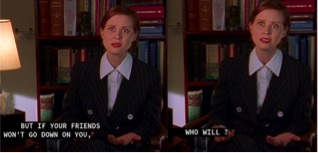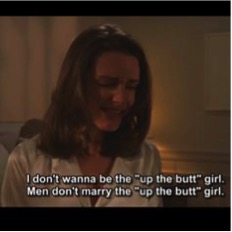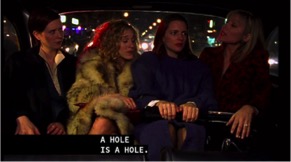Sex and the City: Ned, July 18
Bedford-Stuyvesant, Brooklyn
Dear Ari, Andrea, and Lakshmi,
I have just finished the first season of Sex and the City and wandered, tentatively, into the second. Like some of you, I've had to overcome some longstanding apprehensions. I remember being a preadolescent and seeing an ad for the show's second season. Sarah Jessica Parker is naked with her back to the camera, sitting on the rim of a large martini glass, her legs dangling into a Cosmo. "She's back...for more..." the ad read. I couldn't quite understand what she was back for, or how she had found herself in that giant glass. This was clearly not Alice in Wonderland, or The Incredible Shrinking Woman, a film I had seen in which Lily Tomlin plays a housewife who shrinks and shrinks. This concerned martinis. And that ever mysterious "more." I turned away.
Would that I could look that young boy in the eye and say: Ned, one day you will drink martinis and more with Ari M. Brostoff and she will ask you to write about Sex and the City for a blog. Reader: it gets better.

In some ways it feels completely natural to watch Sex and the City. I have had sex, I live in "the city." I enjoy identifying as a "New Yorker," as I've mentioned I sometimes drink martinis, and I have taken much pleasure in making sweeping generalizations about complex social and sexual dynamics. It would seem me and SATC might just work. Sure, it's dumb, but who isn't! Around episode 4 ("Valley of the Twenty-Something Guys") I was so sure that the show and I could get along that I watched it in the bath, but my computer died five minutes after the tub had filled.
Here is a picture that I took that night, a horrible sext:

Lakshmi, your point about SATC's selective memory rings very true to me: how hermetically sealed everything and everyone seems, and how this feels like pure fantasy. I think this is part of what I have feared I would enjoy but also knew would make me uncomfortable about the show. I've also been thinking about my own memory, because something about the show's memory lapses makes it so that I cannot remember what happens in it. I've experienced the theme park "city" of Sex and the City much as one would an actual theme park: I seem to forget almost everything after viewing, save for a few moments of shock and exhilaration. This effect is intensified, at least in season 1, by the show's form. SATC is, on the one hand, gleefully episodic, a series of self-contained confections that can be distilled in a sentence a la Seinfeld (a "show about nothing"): "the one where Charlotte sleeps with the Hasidic artist," "the one about threesomes," etc. Yet at the same time, and in distinction to a show like Seinfeld, Sex and the City also beckons the viewer to take it seriously as a narrative, to make longterm commitments, to wonder what will happen to Carrie—will she ever find love?—while simultaneously accepting that it takes place in a world without change. That Sex and the City can simultaneously feel like a marriage plot and a one-night stand is part of its luster, but also produces a particularly amnesiac effect.
Things I remember:
I remember that Miranda is a lesbian, I mean lawyer, and pretends to be a lesbian in hopes that a stable, if staged, homo relationship will get her promoted to partner. God bless Syd, the lesbian who must pretend that Cynthia Nixon is straight.

I remember that Carrie sometimes wears pigtails.

I remember Justin Theroux with a necklace, but I won't include a screenshot of that.
I remember when Charlotte doesn't want to be an up-the-butt girl.
And I remember when they all jubilantly try to convince her that she should open herself up to "up-the-butt."

I remember that Samantha loves jazz and meets the man of her dreams while enjoying live jazz alone in a velvet room, before their love is promptly ruined by his small penis.
"Why is it so hard to find a man with a big dick who loves jazz?" I would write in my weekly column, or maybe say aloud over the phone to an old friend as soon as they answered. "Why is it so hard to find a man with a big dick who loves jazz?" I say into the phone, no hello. "Who is this?!" my friend yells back. I have blocked my caller ID. I am a terror. I am a Carrie.
*
Season 1, episode 8 is called "Three's a Crowd." Charlotte meets an architect at a disease benefit, who seems perfect until he wants to have a threesome. Samantha sleeps with a married man whose wife—as soon as she finds out about the affair—wants to have a threesome. Miranda is deflated to find that none of her female friends want to have a threesome, so answers an ad for one. Over a diner meal early in the episode, the women casually decide that one can be either a sex girl or a relationship girl, and that this correlates to one's openness to threesomes. When Carrie tells the group, "I've never done a threesome," Miranda knows why: "Because you have relationships."
After the diner, Carrie lets her hair down a bit and sets to work on her column, weaving beautiful clickbait: "Maybe threesomes were the relationships of the future." A few scenes later, she is shocked to learn that Big—the man of her dreams, "the next Donald Trump," as Samantha tells her in the first episode—has had a threesome with his ex-wife. Hearing this, Carrie abruptly stops tying his tie. "You were married?" "Yeah, I thought I told you," he replies, guiltily. "No, no you didn't," she says, a vague look of fear spreading across her face. Big leaves hastily.
Get angry, Carrie! He is clearly a very bad communicator! He acts gaslight-y and weird when you mention that he's never told you! He gets to be a sex girl and a relationship girl, and he makes you pick! He doesn't have to pick! He's the next Donald Trump!
"Get out of there!" I scream at the television, like it's a horror film, like Big is Patrick Bateman and Carrie is Chloe Sevigny. No, Chloe Sevigny is not there. Chloe Sevigny is downtown. Chloe Sevigny is in the East Village with Harmony Korine. I scream like Big is the next Donald Trump. Get out of there, Carrie.
If only. Instead, Carrie internalizes Big's flip attitude and worries that she's not doing enough for him sexually to keep him satisfied. Instead of getting angry, she feels deep shame, which in turn angers me because, I get it. She should have known.
Should have known what?
"There's only one thing left to do," Samantha says, looking conspiratorially at Miranda as they try on lipstick.
"What, leave him before he leaves me?" Carrie asks. I sigh in relief.
"Check out the ex!" Miranda says. I scream, and Carrie checks out the ex.
Carrie likes the ex. The ex works in publishing. Carrie pitches a book to the ex: a children's book about cigarettes. This actually sounds like a good book. For a moment, I hope that maybe Carrie will develop a passionate and erotic working relationship with the ex and we will follow the development of the children's book to publication while Big continues his soulless path alone. Instead, Carrie stays quiet and Big sums up his divorce in bed one night. "Alienation of affection followed by divorce...let's not talk about the past, please," he says patly, his sagging face crinkling into a half smile like a benign Ent, a human yawn. Sultry smooth jazz saxophone plays. They patch things up later, when Carrie confronts Big about his communication issues and he tells her that he and his ex had a threesome because they were both unhappy in the marriage. She becomes a puddle in his arms. Better jazz plays.Despite its best efforts, SATC's first season cannot reconcile its marriage plot with its one-night stands. Carrie knows that one cannot be a relationships girl and a sex girl, and she doesn't actually think threesomes are the relationships of the future, but that doesn't stop her from writing it in her column. Only through forgetting can the women of Sex and the City "have it all," which is part of why the show feels so repetitious.
Charlotte, Miranda, Samantha, and Carrie can have as much crazy sex as they want, but it's not like that doesn't still have a price. Miranda, Charlotte, and Samantha shrug off this bargain when they need to, which makes them comic characters. Carrie Bradshaw's pathological belief in the price of sex makes her a protagonist, the person inside us we hate to love. Carrie muses and wonders recklessly when writing her column, but when it comes down to it, her priorities and standards are airtight: she wants Big to sweep her off her feet, and she wants his threesome (and marriage) to have sucked. As a columnist, she is a romantic anthropologist, a free spirit, a genius of speculation, but in her life, she wants Marriage Material, and her criteria for Big are more connected to his marriageability than to any of his personal qualities. Carrie's writing is what draws together the show's episodic structure and its narrative drive: each episode is organized around one of her columns. Meanwhile, the story we are meant to invest in is her desire for Big to put a ring on it and thus obviate the conditions that allow her column to exist in the first place.
In the end, Carrie is able to forgive Big for having had a life prior to meeting her, not because they've learned more about each other, but because they haven't. He gets through their argument without exposing his feelings, Carrie forgives him, and he remains a phallic specter. Better a phallic specter than damaged goods. She forgives him because he tells her exactly what she wants to hear. And because he's the next Donald Trump.
The Slow Burn, v. 4: An Introduction
Ivan Ramos (Guest Post), October 1
Audrey Wollen (Guest Post), October 22
*
The Slow Burn, volume 4, will run in this space all summer. Previous summers can still be found on Post45:
2015: A Summer of Elena Ferrante's Neapolitan Novels - Sarah Chihaya, Merve Emre, Katherine Hill, and Jill Richards
2016: Summer of Knausgaard - Diana Hamilton, Dan Sinykin, Cecily Swanson, and Omari Weekes
2017: Welcome (back) to Twin Peaks - Michaela Bronstein, Len Gutkin, and Benjamin Parker